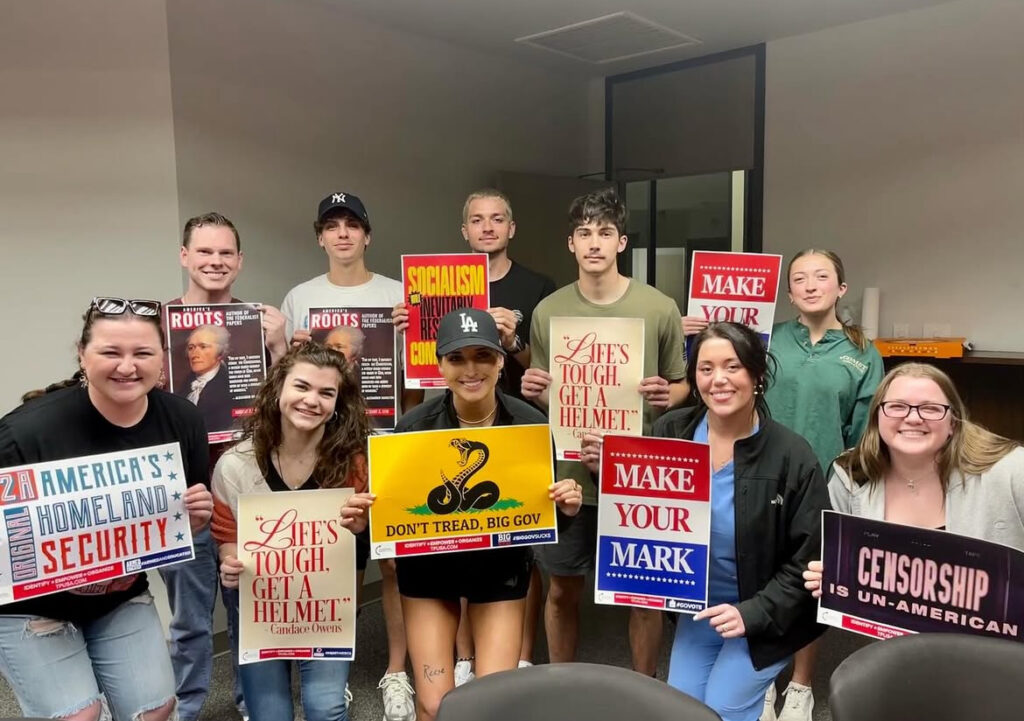
OCU Turning Point USA Members at a chapter meeting (Instagram/tpusa_okcu)
Turning Point USA, a national nonprofit organization that advocates for conservative views on high school, college, and university campuses, has officially established a chapter at Oklahoma City University.
Turning Point USA is a national organization with chapters across college campuses nationwide.
According to its website, the organization aims to empower informed civic and cultural engagement grounded in American exceptionalism and a positive spirit of action (“Turning Point USA”).
With the new establishment of Turning Point USA at OCU, the organization has been sparking significant discussion among the students here on Campus.
The Campus spoke with Adrianna Stuke, the president and founder of OCU’s chapter, to learn more about why the organization was created, its values, and its mission.
“I had an experience with a professor that made me feel singled out for my beliefs, so I contacted TPUSA. From there, it was just about ensuring every student, regardless of personal beliefs or political views, has a place to express themselves.”
When asked about the role of discussion in political and social growth between students, Stuke emphasized the importance of having conversations with one another, “To have growth as a nation, we must be willing to have conversations with people we disagree with, whether to find common ground or to find where we can help one another. It’s important. When we don’t talk, we become complacent. Which leads to assumptions being made that are untrue.”
While some students see the new organization as an opportunity for dialogue and a space for individuals to voice their views, other students have expressed concerns about its potential impact on minorities on campus.
Adele Marie, a third-year student, spoke with The Campus about their concerns regarding the organization.
“Turning Point USA’s presence on our campus is both disheartening and perplexing. OCU should be a space where students can exist authentically, but TPUSA has fostered an environment where bigotry thrives under the guise of ‘free speech.”
Additionally, Adele Marie raised concerns about the ideology that is associated with Turning Point’s USA national leadership.
“Charlie Kirk, TPUSA’s founder, has called the Civil Rights Act of 1964 a ‘huge mistake,’ claimed Black pilots are less qualified due to DEI initiatives, referred to rising LGBTQ+ identification as a ‘social contagion,’ and pushed the Great Replacement theory—a white nationalist conspiracy rooted in eugenics. That’s the ideology TPUSA brings to our campus, and I find it shameful that OCU faculty allowed them to take root.”
The Campus contacted The Office of Student Engagement to inquire about the registration process for establishing a student organization.
Every student organization must adhere to specific Office of Student Engagement and Student Affairs guidelines.
The Office of Student Engagement also confirmed that TPUSA OCU met all requirements to be recognized as an official organization.
“Yes, interested student organizations work through the Office of Student Engagement to receive recognition by meeting certain requirements. And, yes, this student organization completed the requirements for recognition.”
These requirements, outlined in the Registered Student Organization Guide Handbook, are designed to promote values that foster student engagement and community.
The guidelines highlight and ensure that all student organizations, regardless of beliefs, must follow the values of collaboration, responsibility, and community involvement.
The goal is not to endorse one viewpoint but to support the students on campus with opportunities for student engagement that align with the values and guidelines set by The Office of Student Engagement and Student Affairs.
You can find the Registered Student Organization Guide on ENGAGE to learn more about the guidelines for establishing a student organization.
As Turning Point OCU continues to establish itself, it remains the topic of discussion.
Various students feel that the organization will foster open discussions and provide a space for students who feel judged on their beliefs.
However, various students think the organization’s presence and history will contribute to an unwelcoming space for marginalized groups on campus.
As the conversation continues among OCU students, a prominent challenge remains.
How can OCU balance ideological diversity and student engagement while ensuring all students feel welcome and respected?


thank you